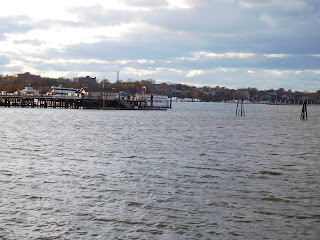I try not to spend too much of my life living vicariously through others. Sometimes, though, I can't help living, if only momentarily, through the triumphs and accomplishments of others: There are some things I simply can't do on my own. Then there are other things that, for all sorts of reasons, I probably will never do.
For example, I doubt that I will ever decorate a house for the holidays in the ways I sometimes see. Buying a poinsetta plant and, perhaps, hanging a wreath or the Christmas cards I receive is about as far as I go in bedecking my apartment for the holidays. Even if I ever buy a big house, I doubt that I will ever turn it into the sort of display I have seen in my neighborhood during the past few years:
I took those photos last year. The house's residents have created the same spectacle in each of the past six years I have lived nearby. I passed by that house on my way to work this morning but didn't notice any decorations. Perhaps they're in the works. At least, I hope so. I really love that display, more than I ever thought I could love such things.
For now, I will content myself with this:
which I found on brown bobbin. Thank you, Melissa!











